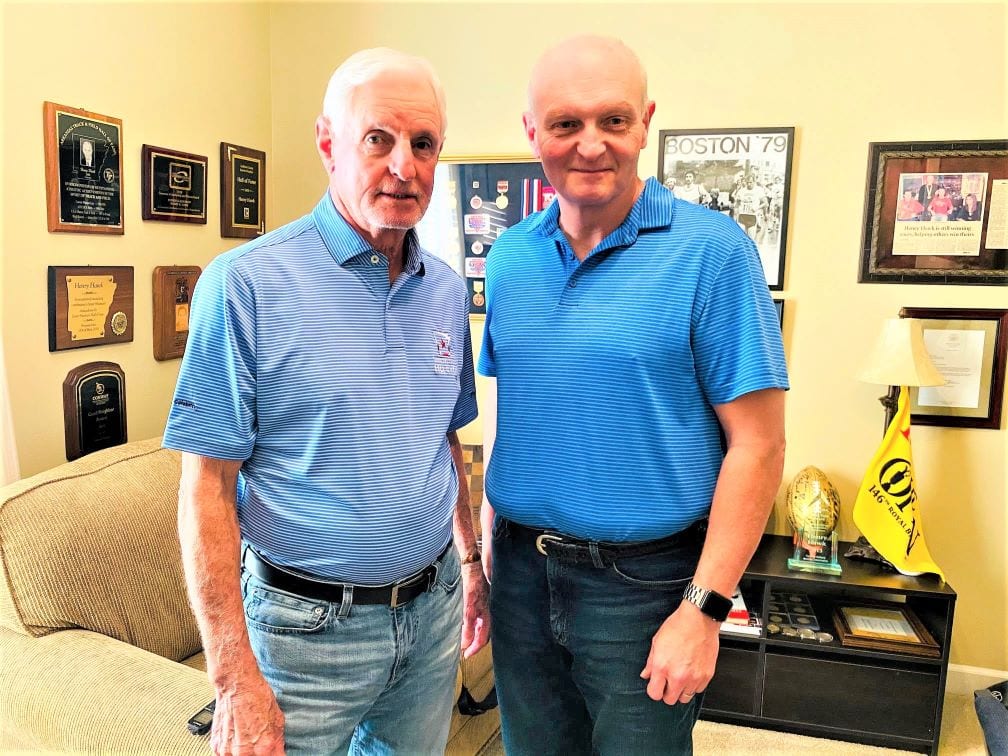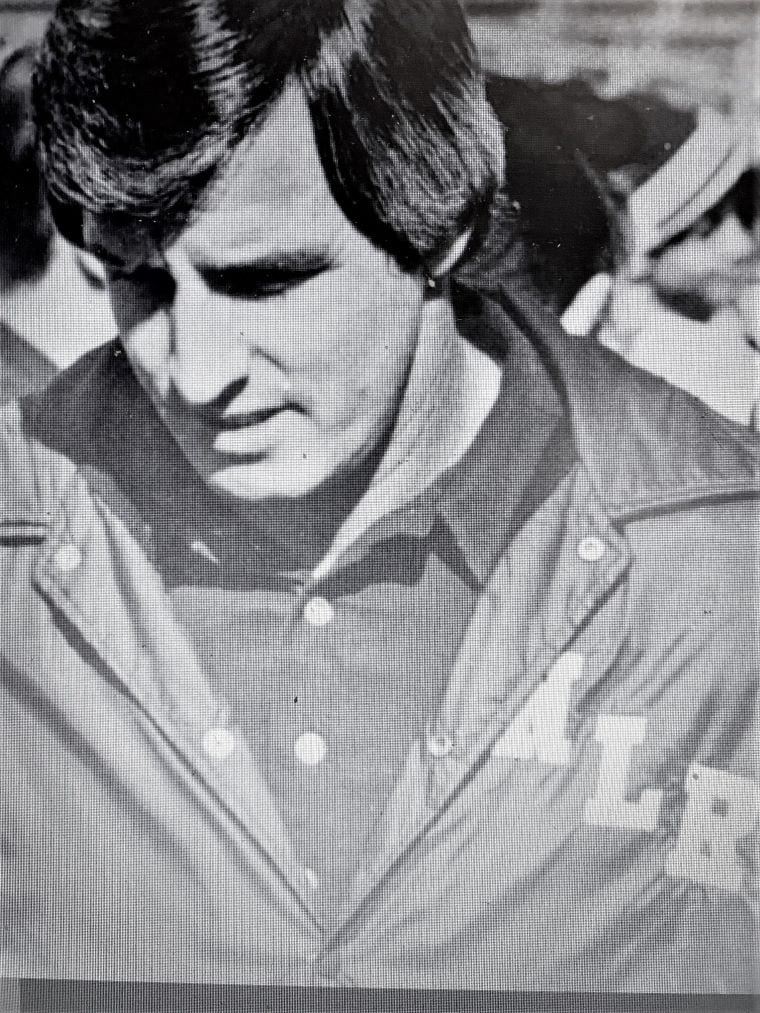Note to Our Readers: This is a reprint of a RNN Sports story that was originally published in December 2020. In honor of coach Henry Hawk’s 50th anniversary of his 1972 state football championship at North Little Rock High School, RNN Sports is pleased to run this story again during state championship week.
On a more personal note, Coach Hawk was our football coach during my years as a student at North Little Rock, and he is a man that I greatly admired then, as well as I do today. As football fans in both Booneville and Charleston eagerly await Saturday’s state championship game, I thought it would be noteworthy to take a few minutes to think of the coaches and what they represent to both their players and communities. Long after the game is over next Saturday night, the players will always remember the relationships they have made with their coaches, and I hope each one of them remembers theirs as fondly as I do coach Henry Hawk.
I hope you enjoy his story. -Jim Best
It was an uncharacteristically warm December day, and I am in my car driving to Conway. On the way, my mind is swirling with so many thoughts that it is difficult to make sense of them all. I am on the way to be reunited with our former high school football coach after 43 years. The last time I saw this great man was on graduation day in June 1977, and he was there helping with the evening’s commencement exercises.
Henry Hawk, former head football coach at North Little Rock Ole Main High School, was our head football coach when I was enrolled there as a student from the fall of 1974 to that graduation day in June 1977. He was a “larger-than-life”figure then, and he remains so today.
On Thanksgiving Day of this year, I published a story on Resident Press of a famous game between NLR Ole Main and LR Catholic High School. The game took place 45 years ago this past Thanksgiving Day, and Coach Hawk, who was constantly working to give our team a chance to win, not only on the field, but in life, came up with a way to help the Wildcats win that day. If you did not read the story, I highly recommend that you go back to the article on Resident Press and read it.
As I neared Coach Hawk’s home in Conway, the anticipation grew, and I couldn’t believe that it had been 43 years since I last saw or spoke to him, and I couldn’t believe that I was going to get the opportunity to see him on this day. In fact, the entire visit was an indication of the man that I have admired and respected for so many years.
Coach read the Thanksgiving Day story, and we communicated the day after on Facebook Messenger. It was the first time I had spoken to him after so many years. I asked Coach if he would like to do an interview, and he graciously accepted. When I asked him about scheduling the interview, he was again very gracious and said it could be done over the phone or at his home. Then he followed up and said that he would like to show me what he had done with this “man cave”. That meant so much to me, that after all of these years, he wanted to invite me into his home. But that is Coach. That, among so many other reasons, is why I have always admired and respected him so much. Way back in the late 1970s, I was a nobody in his program. I was not one of his many star players who played for him. But I learned so much from him; from the way he ran his program, to the ultra-high standards he lived his own life by everyday. He was and remains today the most disciplined and mentally tough individual I have ever had the privilege to know. As a coach, Henry Hawk was a “man’s man.” He was demanding, straight forward, and was very honest with everyone. He expected a lot from himself and others around him. As a student, I knew I looked up to him, but as I moved through adulthood, I have come to respect and admire him even more. So as I approached his home on the drive to Conway, I felt that this would be a moment in my life when I would truly be, in the presence of greatness.
Coach Hawk is a very humble and no-nonsense man. He believes in discipline, working hard, setting goals, and then working hard to achieve them. And that is exactly what he has done for his entire life. Coach was inducted into the Arkansas Sports Hall of Fame in 2006, and most recently, in 2019, was inducted into the Conway High School Hall of Fame. But that is just a very small part of his life and accomplishments. And on this day that I will never forget, I sat down with Coach in his home to reflect on his life, career, and passion for living that he maintains today.
I was greeted at the door by Coach and his wonderful wife, Jane. They graciously welcomed me into their home, and after a brief conversation, Coach and I adjourned to his “man-cave” that was adorned with many awards and mementos of his life time accomplishments. After about 45 minutes, Coach finished showing me awards that ranged from his All-American career as a running back for the University of Central Arkansas (named Arkansas State Teachers College, or ASTC back then), to his passion for running that included running ten straight Boston Marathons, and his world record indoor mile run in the 60-64 age group. That’s right….a world record holding runner!
As a coach, he coached the 1972 state 5A (that was the highest classification level then) football champions at North Little Rock. In fact, I owe Coach an apology. I incorrectly stated in my Thanksgiving Day story that Ken Stephens had coached the ’72 team. Coach Stephens, along with Coach Hawk also coached the state champion 1965 team at North Little Rock, and head coach Henry Hawk coached the 1972 state football champions. So, Coach Hawk, I will run a mile for the error after I publish this story, just as you had your players do after practice.


As impressive as all of this is, it is by far not the end or the most significant contributions Coach has made in his life. Most recently, as a fitness instructor at Centennial Valley Country Club in Conway, Coach met a lady in his class that had experienced the great tragedy of seeing her son be involved in a four wheeler accident that did not kill him, but crushed his sternum and left him as a quadriplegic. Coach showed me photos of him in the hospital shortly after the accident, and they were among the most gruesome and startling photographs I have ever seen. His doctors told his mom that the only thing he would ever be able to do for the rest of his life would be to blink his eyes. She shared this story with Coach, and he told her that although he was not certified to work with such patients, he was willing to work with him every day through fitness training, specifically weight training, at no charge, to see if he could help him regain some of his mobility and ability to live as normal of a life a possible. The results have been staggering. Coach, EVERY day for five years, would go to his home and work with him. That is the man I know; the discipline, the dedication, and the desire to find a way to win, that is Henry Hawk.
But I will let him tell the story. I recorded almost 90 minutes of audio in our interview, and in this story, I have included some of his comments during the interview.
As Coach began to go around the room, he first pointed to his award for “Coach of the Year.” He began by saying, “We can just start right here (pointing at the trophy) this is for coach of the year. My wife would not let me put this in here (in jest), and my new son-in-law said how many people do you know has got this? That needs to be in here. That was in ’72.”

Coach Hawk has published a fitness book with the Baptist Health System, and he had a copy on display. “This is a fitness book that Baptist Health, I taught fitness classes for about 20 years, and we put that book out.”

The Youtube video below, entitled “The True Athlete” is an excellent summary of Coach Hawk’s work and dedication. As he made a difference in the lives of so many boys, turning them into men, Coach continues to make his mark by helping others. I suggest that you take a few minutes to view the video below. If it doesn’t inspire you and bring tears to your eyes, I don’t know what would. The video captures why I have respected and admired this man for so many years.
(Video Credit: “The True Athlete”, Youtube.com)
As he pointed to the article on the plaque below, Coach said, “the one in the middle, there, I met with him for eleven years. He’s married, has a car lot, got a garage, the two of us working together, the true athlete. I think we were lifting weights, or something, and he said boy, if we keep doing this I will make a true athlete out of you.” I mentioned to Coach that I thought his work after retirement of working with paralyzed patients was perhaps his greatest work of all. He said, “Well, I have enjoyed it.”
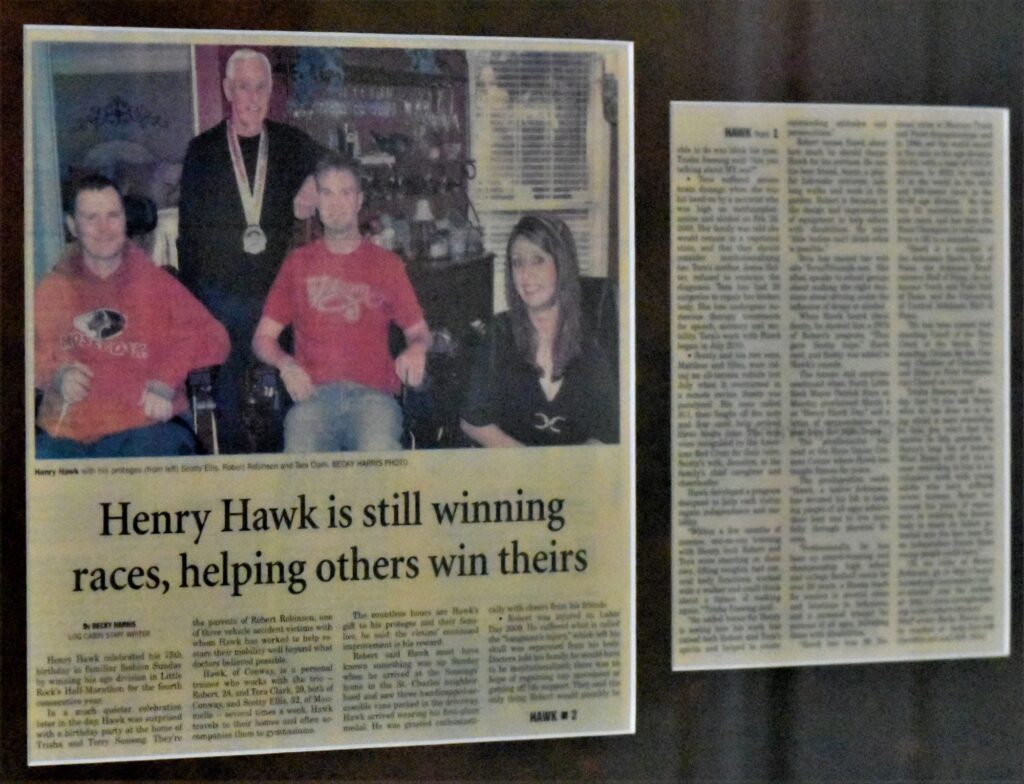
Our conversation switched to my frame of reference of when I knew him when I was a high school student. I shared with Coach that he was a bigger-than-life figure to me and so many others. I told him that I don’t think I have ever met anyone in my lifetime that was a more dedicated and disciplined person than he is. I remember him running several miles after every practice; probably the only coach I have ever known that was in better shape than his players. Coach replied, “that’s why we had the program that we had. I had 900 feet of film of drills that we did in the off-season.” I remember that players had to run from their last class to the locker room to get dressed for every practice. Coach said, “that’s right, and we never walked on the field.” Coach continued, “and they (the players) never complained. Because they knew that I was working harder than they were. And they challenged me. In fact, the way I got into running, I challenged the players on my 40th birthday, during off-season, I will run 10 miles. But then, you (the players) have got to set a goal. So, I went out and I ran the 10 miles. So, I went back and told them that I could do that. I told them that I will run it at a 8 minute per mile pace. And then, I did that. So, I went back and said, OK, I know I can do that. So what I am going to do is that I am going to challenge you guys. I’ll run nine miles, and if anybody in this room, and it can only be football players, run the tenth mile with me, and if you beat me, you can have some time off. But understand what I am saying, if you don’t beat me, button up your chin straps. Because we are going to get after it harder. They (the players) had a team meeting and there were six of them who convinced the others that they could beat me. So, on that birthday, March 4, the word was out. We had students and a pretty big crowd out there. So, I take off and run the nine miles, less than 8 minutes per mile pace. All six of them jump in, and Joe Abernathy, he was a miler as well as a football player, probably the best athlete in school, but he jumps in and gets them out about 200 yards ahead of me. I just kept going and I passed four of them, and the other two, if I had had ten more yards, I would have beat them. Monday rolls around, and the kids are saying, hey man, we have some time off! And I said, you know, I think I am just going to cancel off-season. Ya’ll are so good that two people in this room can beat a guy that is 40 years old and has already run nine miles in one mile. I said, I think I am going to call it off. Boy, they went to work. Johnny George, a player on the team, said I am going to run ten miles before school is out. He would go home, get his homework done and then go out and run. He did his ten miles before school was out that year.”
Coach Hawk’s off-season program was nothing short of phenomenal. In fact, the work ethic and the men he made from boys during the off-season is why his football program was so successful. So good was his off-season program, it caught the eye of some of the biggest names and legends in the college coaching ranks. “I took a film to St. Louis to the Kodak Coach of the Year Clinic. Bo Schembechler (Hall of Fame Coach at the University of Michigan), John McKay at USC, Barry Switzer, University of Oklahoma, and there I was as a high school coach. All of us as high school coaches were in one session, and after it was over with, I was the only one who was asked back to talk with these college coaches. I went back, and all of the college coaches said, just one question, how do you get an athlete to do that (work that hard in the off season)? They said, we wouldn’t have any athletes if we did this. I said, they don’t know any difference. That’s just the way it was with our program from day one.” I asked Coach how he got all of his players, who came from varying economic and racial backgrounds, to buy into his system and expectations. He answered, very simply, “one set of rules.” It didn’t matter who you were on the team, there was one set of rules for everybody. He has left players behind on game days when they were late for the bus, and he has dismissed an entire offensive line from the program for breaking school policy and embarrassing the program. One set of rules; it was fair and easy for everyone to understand.
And that’s the way it was with Coach Hawk. He operated his high school program on a higher level than what I had seen in others. After having played football at UCA from 1956-60, Coach was designated as an All-American running back in 1959, and signed to play professional football with the Canadian Football League’s Hamilton Tiger Cats after graduation. In August of the year, the country was at war with North Korea and Coach decided not to go to Canada. He did receive interest from the Los Angeles Rams and the new American Football League (AFL) team, the New York Titans (who later became the New York Jets). “So, I was going to go to Los Angeles, but I had to get a coaching job in education, so I did.”

Conway has always been home to Coach. He grew up there, went to high school at Conway High School, and later starred at UCA as an all-american football player. In 2019, Coach was inducted into the Conway High School Hall of Fame. He proudly displays his plaque today in his home in Conway.
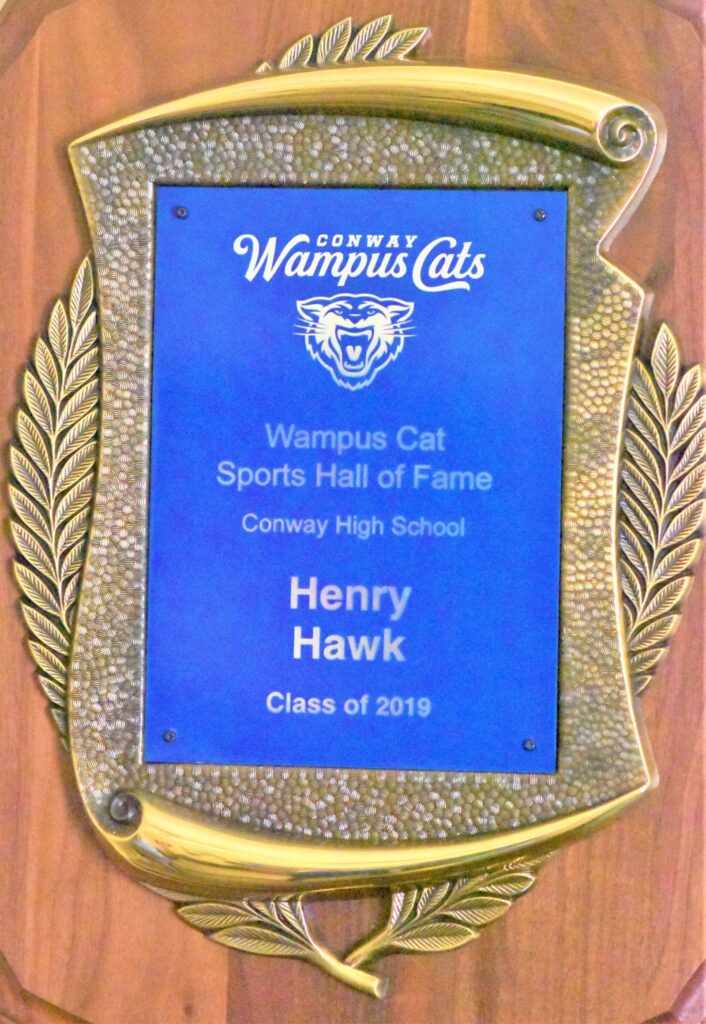
Perhaps his biggest coaching honor came in 2006 when North Little Rock Ole Main football coach Henry Hawk as elected to the Arkansas Sports Hall of Fame. Coach was inducted along with Razorbacks running back Gary Anderson, Ray Brown who played at Arkansas State University and the Washington Redskins, Bernie Cox, legendary football coach at Little Rock Central High School, John Daley, Razorbacks and PGA golfer, Bettye Fiscus Dickey of Wynne High School and the Lady Razorbacks basketball program, Paul Eells, broadcaster of Razorback football and KATV, Fred Grimm, who led the Razorbacks to the NCAA basketball tournament in 1956, Charles Ripley, legendary basketball coach at Little Rock Parkview High School, and E.C. O’Neal, a star basketball player at Arkansas Tech University in the 1950s. Some company for an outstanding coach and a true athlete.

Perhaps the biggest influence on Coach Hawk’s life was his college coach, Raymond Bright. Bright was an assistant coach at then ASTC from 1958-1964. Born in Hope, Arkansas, Bright coached football in the Conway school district until 1958. “He came over (to ASTC) my junior year. Then after I graduated, I went to Canada and came back. I went to Bald Knob, and then to 4th Street Junior High in North Little Rock. I eventually elevated up to high school (at North Little Rock High School). I was track coach and assistant football under Ken Stephens. Then Coach Bright took over as head coach at UCA, and he had been my high school coach. He’s the one that, everything I did, he’s the one that I learned it from.”
This answered a question I had for Coach. Where did all of this commitment and discipline come from? Coach answered, “He (Coach Bright) was a tough customer. They say when he was in college, they had to put him in a cage all week or he would hurt the whole team. They just turned him loose on game day! He was kind of a small guy, but they say he was mean!”
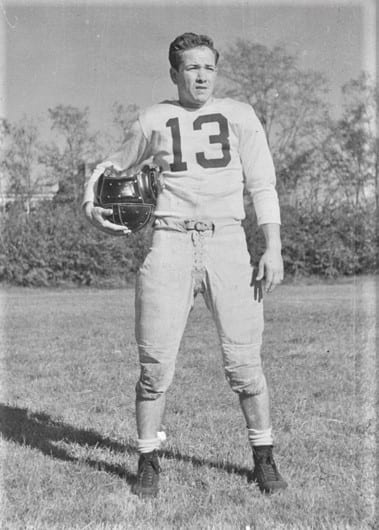
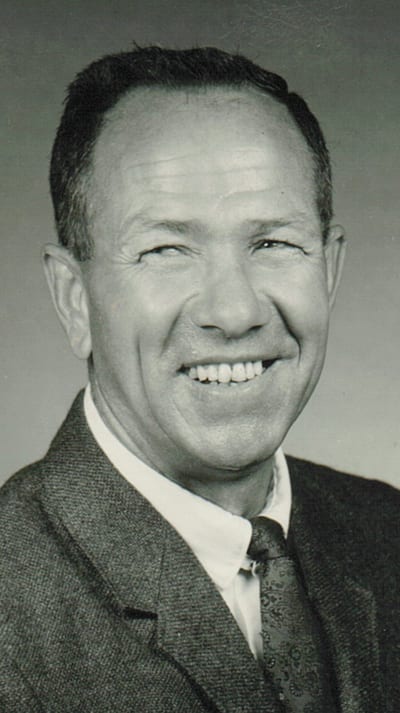
Coach Hawk was not interested much in school as a child. He loved sports, and his credits Coach Bright as being the single-most influential figure in his life. Coach Bright, starting when Hawk was in junior high school, would check up on him to make sure he was in school and keeping up with his academic work. In athletics, Coach Bright was instilling the dedication and work ethic that Hawk went on to have as a player and coach. In short, Coach Bright was a second father to Hawk, and he becomes very emotional still to this day when he talks about how much Raymond Bright means to him. And that same thing can be said by so many players who played for Henry Hawk at North Little Rock.
Henry Hawk coached a long list of notable high school athletes at North Little Rock that went on to play Division I and Division II football. Razorbacks Charley and Ricky Jones, brothers who went on to play for Lou Holtz at Arkansas as defensive linemen, played for Coach Hawk in the late 70s. Razorbacks tight end Tim Adams, who played for Lou Holtz in 1977, played his high school football under Coach Hawk. A long list of players went on to play college football, but perhaps the most famous being Phillip Dokes who played for Coach and went on to be perhaps the best defensive end in Oklahoma State Cowboys history. Dokes played two seasons professionally with the Buffalo Bills. Dokes’s life came tragically to an end at the all too early age of just 34 when he died of a brain aneurysm.
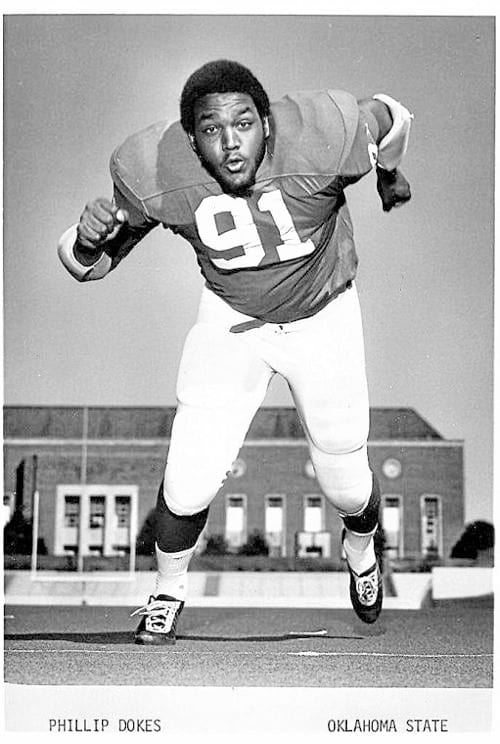
The athletes that Coach had at North Little Rock Ole Main were kids that came from middle to lower-middle class families and neighborhoods in the city. The came from families and circumstances that knew what hardship was, and in short, they were tough as nails. Coach, in his own way, worked hard and demanded much from everyone to make them the best they could be. It is the same standard he lives by today and has expected from his patients that he has worked with who have catastrophic injuries.
And Coach stood up for his players, his program, and the school. When the shift in school board and administrative politics began to favor the new Northeast High School in the Lakewood community, it was Coach who stood up to the powers that were at the time who wanted to favor Northeast High School due to the money and influence in the Lakewood community. Northeast High School opened in 1970 and remained as a stand-alone high school until 1990. The Northeast Chargers, coached by John Narkinsky, became the new rival to the now Ole Main Wildcats. The North Little Rock rivalry with Little Rock Central was still there, but there was no question that both Northeast and Ole Main considered themselves to be prime rivals. And it did not set well with the district administration, school board, and other power brokers in Lakewood with Coach Hawk and his Ole Main Wildcats would consistently beat Northeast. Coach was a good game planner, and his players would not be under prepared or out worked by Northeast or any other school they would face each year.
And with much consternation by the the NLR school administration, school board, and the others in Lakewood, it was Coach Henry Hawk and the Ole Main Wildcats who consistently defeated their cross town rivals. Even to the point that the NLR administration called Coach into their office to ask him, “what do we have to do to beat you?” In classic Coach Hawk form, he replied, “I don’t know.”
Can you imagine a coach being asked this? And it didn’t end there. It appears that there was such an effort to turn the attention to the new high school, that when Coach Hawk qualified for and trained for his first Boston Marathon (he completed 10 in 10 attempts), he was again called into the district office and told not to go to Boston. Coach followed policy and took personal leave to go to Boston, but the administration simply did not want him and the school to gain publicity and cast an even bigger shadow on Northeast High School. Can you imagine?
But as the years went on, it was Ole Main High School and its campus that withstood the test of time and the politics of the late 70s. Northeast ceased to exist as a stand alone high school in 1990 when the district re-organized and created North Little Rock High East and West campuses. Students in grades 9-10 went to the former Northeast campus, and students in grades 11-12 went to the former Ole Main campus. The two schools eventually consolidated their colors, names and mascots to include the blue of Ole Main, the gold of Northeast, and mascots of the Ole Main Wildcats. The new school’s blue and gold Charging Wildcats became the school that it is today. The old Wildcats Stadium, where so many memories were made is gone, but it has now been replaced by a state of the art new stadium that faces north and south, unlike the old stadium that faced east and west.
When I listened to Coach tell this story, I was so disappointed in my former school district. Again, as a student, I was oblivious to any of this. To Coach’s credit, he never complained openly or brought us into the politics at the time. But, I am proud to say, Coach Henry Hawk did go to Boston that year and he finished with a time that was in the top ten percent of finishers in his age category. That is the man I am so proud to say was our coach; he stood up for what was right and he overcame the unfairness of the local politics. He is a true champion. In fact, he is World Record holder in his age group. But most importantly, he has great character.
I could go on and on about this great man and what he has meant to me and to so many others. Although he has had a stellar career in so many areas, Coach is not one to dwell on past accomplishments. When some want to sit around and talk about the old days, getting better as the years go by, that is not for Coach Hawk. He is still moving forward; he is moving forward with his running, his daily, morning workouts and golf games, and with helping people who have experienced great tragedy in their lives to regain some sense of normality so that they can move forward. He is a former deacon in his church and in this special way, has served his church and the spiritual side of his life and the lives of others.
So, I could go on seemingly forever talking about this special man who has meant so much to not only me but countless others. As our visit continued, I hung on every word and every story he shared. We even discussed the possibility of writing a book of his life that incorporates a personal fitness routine that he developed that targets various diseases and disorders. Absolutely amazing.
As I end this story, I want to share with you an excerpt from two notebooks of notes that Coach has developed that he entrusted with me to take home and read as part of the foundation for his book. This excerpt, I believe, characterizes Coach Hawk:
“Commitment, commitment, commitment, how many times have you heard this term used? It has been mentioned many times, but it needs to be brought up more frequently. It is much easier to try something for a while, and if favorable results should not come soon, give up and walk away. The commitment is a long term proposition that a lot of people do not want to make.” -Henry Hawk
After 43 years, he continues to practice this commitment every day. I am so lucky to have been a student at the school where he coached, and I realized that unseasonably warm day in December, as I sat in his man cave, listening to this great man, I was, truly, in the presence of greatness.
